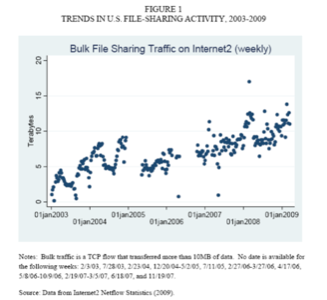According to a new study (PDF) by economists Felix Oberholzer-Gee (Harvard) and Koleman Strumpf (University of Kansas), file sharing and weaker copyright protections generally benefit societies more than they hurt them. Among other things, Oberholzer-Gee and Strumpf argue that file sharing has done nothing to deter the production of books, music, and films. The two economists argue that weaker copyright is desirable, as long as it doesn’t “lessen the incentives of artists and entertainment companies to produce new works.”

One Download Doesn’t Equal a Lost Sale
Specifically, Oberholzer-Gee and Strumpf review some of the latest studies related to file sharing and music and bust some of the myths that the music industry is still pushing, including the idea that every download equals a lost sale. One study, for example, examined the iPod listening habits of 5,600 consumers and concluded that only 64% of the songs on these players had ever been played. It’s unlikely that these users would have paid for the songs they never played.
The two researchers also argue that the fact that music was basically available for free increased a lot of consumer’s willingness to buy MP3 players in the first place. According to another study, 65% of respondents said that they did no buy a CD because they had downloaded a free copy of a song, but at the same time 80% said that they bought a CD because they had sampled it.
In addition, the authors argue that mashups are likely to drive consumers to the original recordings and don’t necessarily lead to lost sales either.
Number of Recordings has Doubled Since 2000
Oberholzer-Gee’s and Strumpf’s focus is not so much on whether or not the music industry is loosing money because of file sharing, but whether file sharing has deterred the production of music. While there are lots of arguments about the financial losses the music industry might or might not have incurred from file sharing, the production of music is clearly up (the number of recordings produced has doubled since 2000), and so is the demand for concert tickets (and the price of these tickets). As for films, even in countries where piracy is rampant (including South Korea, India, China), as well as in the U.S., the number of yearly film productions has only increased in the last couple of years.
This study, of course, comes as a crucial moment in the file sharing debate, as the Thomas vs. Capitol case is entering its final days (our report from earlier today). There, the music industry and the court are still working under the assumption that every copy is a lost sale.
If you have some spare time and an interest in this topic, you should definitely have a look at this paper. It’s actually quite readable – especially for an academic paper by two economists – and short.

CC-licensed logo image used courtesy of Flickr user Rev Dan Catt.

















